We asked some of our veteran teammates to reflect on their service.
May 13, 2021Leadership, honor, loyalty, service, sacrifice. These elements form a common thread running through the conversations with 16 U.S. Department of Energy Office of Legacy Management (LM) and Legacy Management Strategic Partner (LMSP) personnel who served in the Armed Forces.
In recognition of Armed Forces Day on May 15, 2021, we asked our veteran teammates to reflect on their service and what it means to them. Nearly everyone who responded for this article expressed a common theme: “We didn’t serve to be recognized in any special fashion. We served our country because we believe it is the duty of the American citizen to protect the freedoms that we all enjoy so very much.”
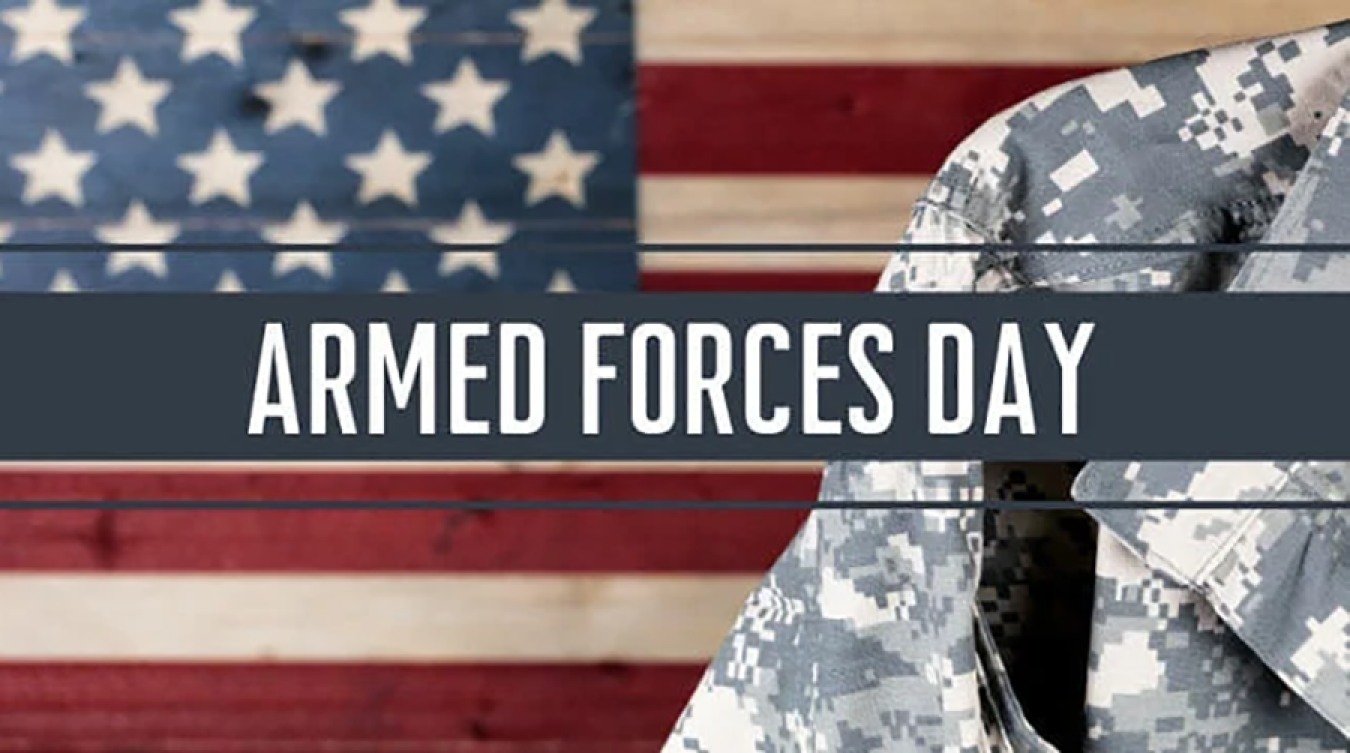
Here’s what some of our LM and LMSP former military members say about their service and how it influenced their current careers.
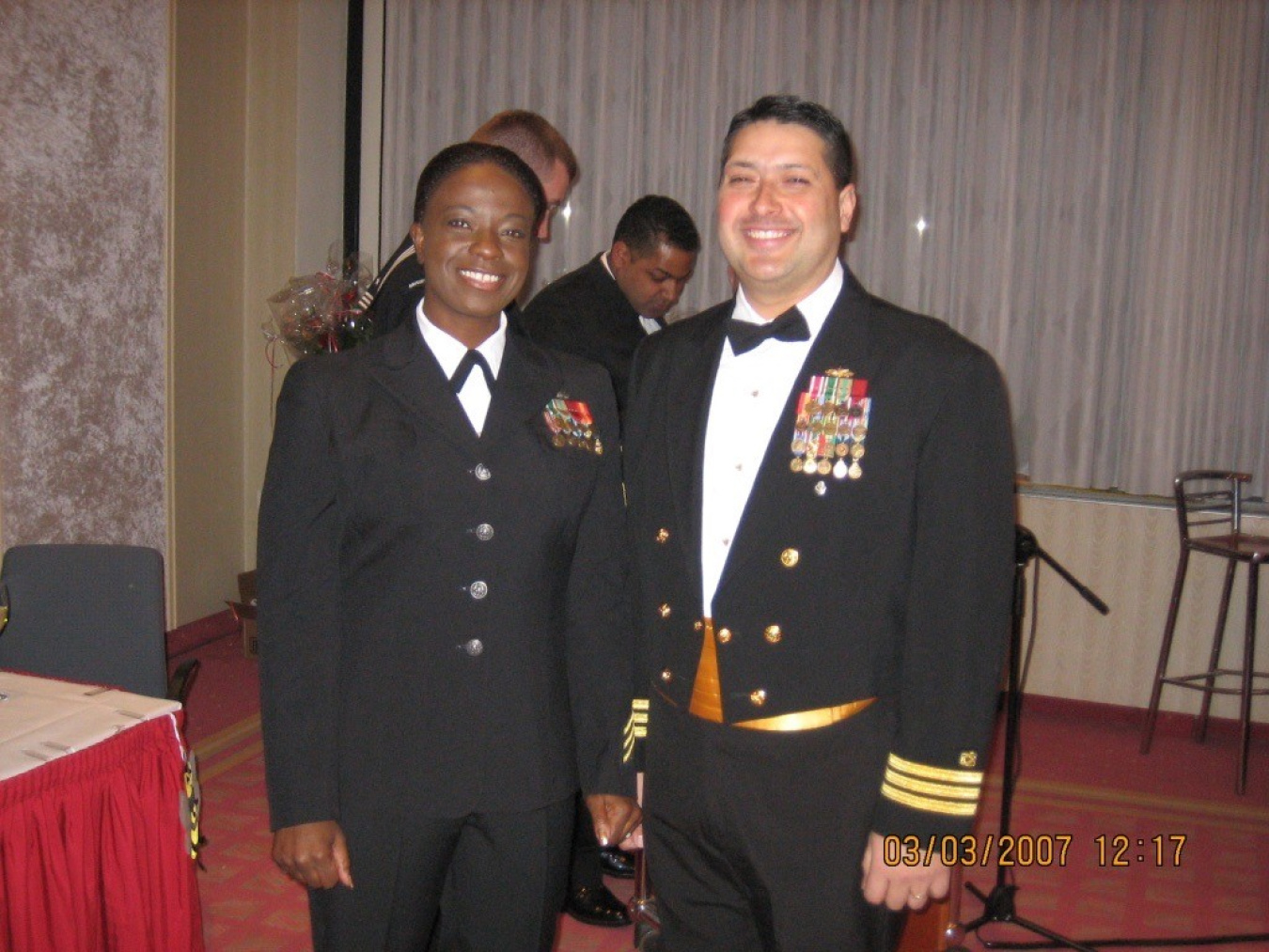
Carmelo Melendez at the 2007 Naval Support Unit State Department Seabee Ball.
Carmelo Melendez, LM program office director, served 21 years as a Civil Engineer Corps officer in the Navy, achieving the rank of commander.
“On this Armed Forces Day, I’m proud to recognize the contributions of everyone who is serving and has served in our Armed Forces. I encourage everyone to practice acceptance, appreciation, and integration of the skills and experiences of our service members whenever we can. During my military career, I completed one Washington ‘big government’ assignment, two combat actions, three humanitarian actions, and four Marine tours. These assignments and actions taught me the importance of collaboration and integration. Knowing is not enough; we must apply. Willing is not enough; we must do. We are a ‘can-do’ organization and our philosophy is ‘One Team, One Mission.’ I want to encourage all our veterans to continue to serve in LM; we need your experience and skills.”

Bruce Akers at Fort Benning, Georgia, 1981.
Bruce Akers, LM, retired from the United States Army after 23 years as a Special Forces major.
“The greatest influence in my military career was when I attended Ranger School. Through this training I was made aware and understood to what extremes I could put my mind and body through both physically and mentally in order to survive. And of the upmost importance was never quit under any circumstances. What I do on the job with LM/LMSP that I learned from my military career is that we are one team and we all work together to accomplish mission. Everyone is important from the bottom up and from the top down. We all bring special skills and knowledge to the work place. That is what makes us who we are.”
Henry Becker, LMSP, served 12 years as a combat engineer in the Army and achieved the rank of captain.
“My service taught me that leadership is an awesome responsibility. There are tried and true fundamentals for proper people and mission management. Good care of others is also caring for yourself: Maintaining your integrity and competence is key to earning respect and influence. A good unit is a good team where ideas and information are shared freely, creativity is encouraged, and restraint and conscientious decisive action are paramount. The most comfortable place to be in your career is when you are knowledgeable, trustworthy, contributory, and always seeking growth. My heart swells with pride and admiration for a younger generation of service people who answer our nation’s call and commit to duty and potential sacrifices in such uncertain times.”
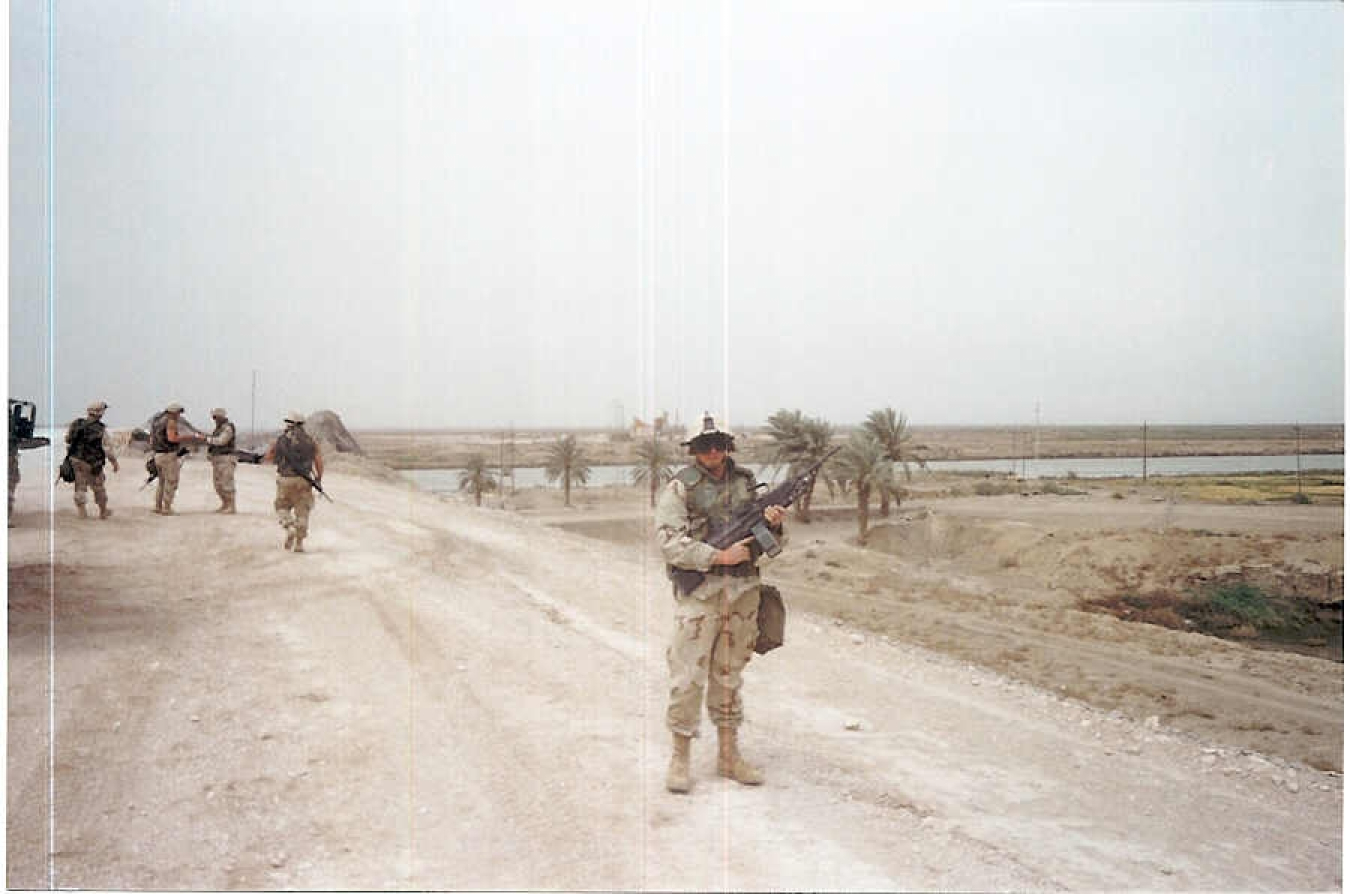
Henry Becker at the Euphrates River near An Nassiryah, Iraq, in 2003.
Walter Curtis, LMSP, served four years as a computer systems technician in the Air Force, achieving the rank of senior airman.
“I had a great time and learned a lot from my Air Force service that I’ve used throughout my life. I worked with early automated digital messaging networks, kind of like email, and learned through experience to document everything as well as possible. I also learned technical troubleshooting skills that still apply today. The biggest influence in my military life was the opportunity for leadership at an early age. Often in the civilian world that leadership is not recognized nor used. Don’t be surprised when you change careers if your military experiences are ignored or not understood.”
Paul Darr, LMSP, served three years as a quartermaster (navigation) in the Navy and achieved the rank of petty officer second class.
“The most important thing I learned from my service was the importance of teamwork. Over the last 30 years, I have worked on several DOE projects where teamwork is what gets the job done. The scope and magnitude of these projects demand that multiple individuals with different backgrounds come together to complete the project. Another concept I brought forward from the U.S. Navy was safety. Every day, my ship provided a one-page Plan-of-the-Day that always started with ‘Safety is paramount in all we do.’ Today that resonates with all that we do on LM/LMSP. It’s kind of funny: an on-board friendship with an officer, who brought to my attention the study of geology, played such a big role in the next 40 years of my life.”
Erinn Fought, LMSP, served four years active duty and two years active reserve as a religious program specialist in the Navy, achieving the rank petty officer third class.
“Regardless of time served, or function performed, the one thing all service members have in common is that at some point in our life, we each made the choice to sign a ‘blank check.’ We designated a period of our lives, to the service of others and our country — with little to no knowledge of what we were signing up for. The most important lesson I learned in the service is to work in support of your coworkers towards the bigger goal. To work together so that everyone is successful in the mission. Setting up resources for your position such that at any time someone else could come in and pick it up where you left off with minimal disruption to the mission. Thinking in terms of ‘we’ rather than ‘me.’ The Navy was my first real job; in a sense, it taught me how to be an adult, how to navigate stressful situation, and how to successfully interact with people from different backgrounds in the workplace.”
Leland Friesen, LMSP, served four years as a cannon crewman and High Mobility Artillery Rocket System rocketeer in the Marine Corps, achieving the rank of sergeant.
“I learned that a person can accomplish anything: Every ‘new thing’ (e.g., new responsibility) can be intimidating and we naturally shy away from it. I have seen all types of people ‘square off’ with this fear of discomfort/embarrassment. Leaning into certain failure, they push forward and come out the other side a more confident, capable person. Whether we fail or succeed, we realize there was nothing to be afraid of. Being accountable for your decisions, gear, and personnel in such high-stakes situations equipped me to be a trustworthy and motivated team player in any situation. I learned that you need to set yourself up for success; maintain high standards physically, spiritually, and intellectually during and after your term of service.”
Jay Glascock, LM, graduated from the Air Force Academy and served as an Air Force civil engineer for 20 years, achieving the rank of lieutenant colonel.
“I learned how to lead from my military service and the importance of leadership. You can read about leadership from a book, magazine, or journal, which is one of the best ways to learn and expand your horizons, but the military helped me put leadership into practice as a young officer. The Air Force provided me with the training and assignments to mature my leadership ability over my career. I learned the importance of leadership concepts like responsibility, accountability, optimism, planning, decision-making, results, and caring for people. The military also taught me the importance of teamwork — and teams do not survive without good leadership. This concept of leading teams and teamwork has helped me to do my job better within LM.”
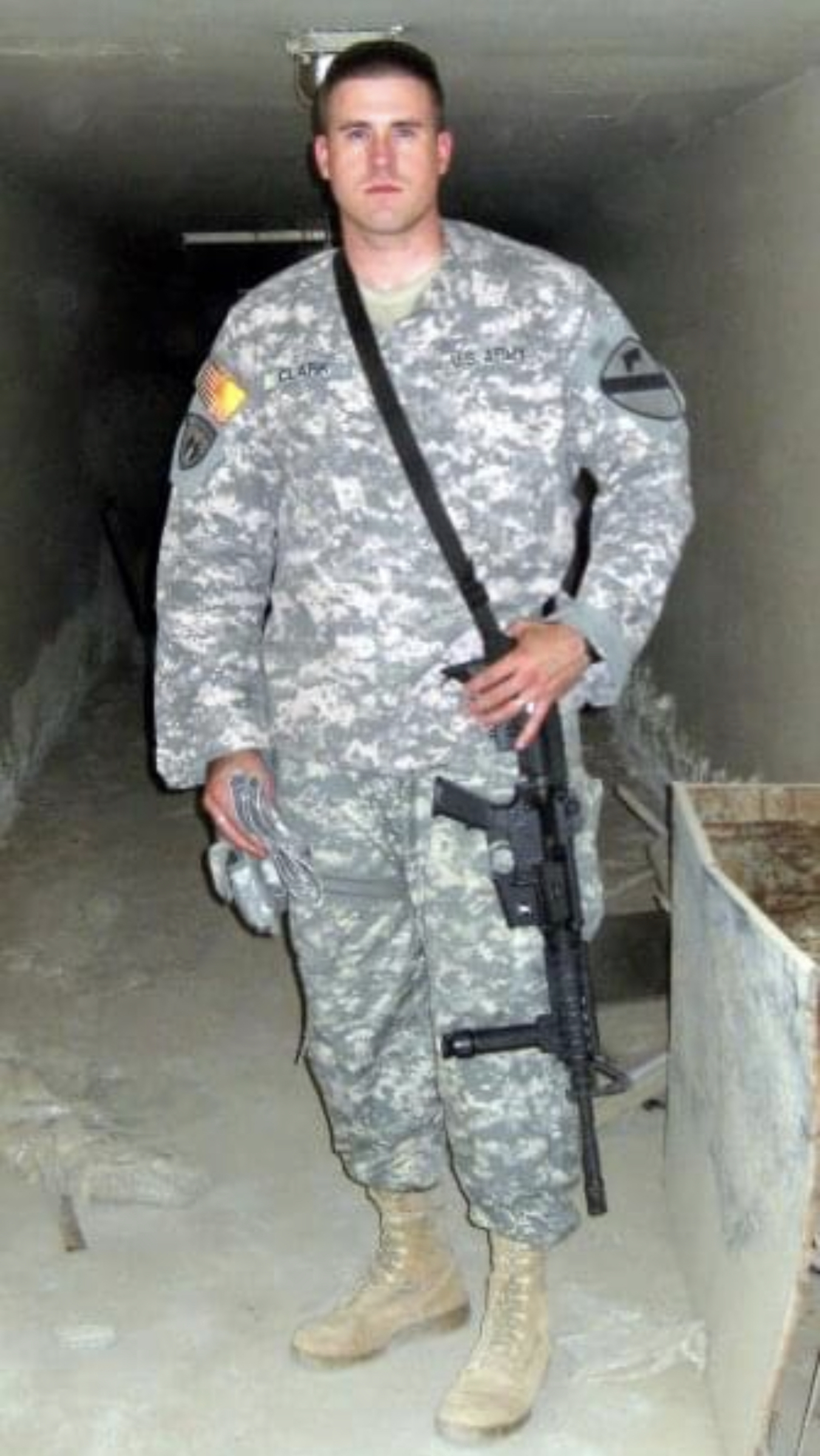
Jonathon Graziano in east Baghdad, near Sadr City, Iraq, in 2010.
Jonathon Graziano, LMSP, served 18 years in the Army as a network switching systems operator/maintainer and human intelligence collector. He achieved the rank of sergeant first class.
“Trust, teamwork, and followership. Nothing gets done without trust, especially in a team. Being a great leader means you must learn to follow first. This requires humility, resiliency, loyalty, and a ‘never-quit’ attitude. Accomplish the mission and always take care of your people. It sounds corny, but I learned a lot about myself by modeling my life for almost two decades on the Army’s Creed of the Noncommissioned Officer. If you live by the Creed, there is no way you will fail. Everyone must be able to know when to lead, and when to receive in single phase (i.e., shut up and follow). Followership is often looked down on in contrast with leadership, when really you can lead through demonstrating good followership and doing your part to accomplish the mission. I try to project and foster an atmosphere where everyone is a leader in their respective fields, and encourage followership and supporting others, in order to accomplish the mission and maintain trust and a good esprit de corps.”

Captain Kristen Holmes’ graduation photo from Squadron Officer School at Maxwell Air Force Base, Alabama, 2001.
Kristen Holmes, LM, served 11 years in the Air Force both in enlisted and officer ranks, as an enlisted medical technician and then as a public affairs specialist, achieving the rank of captain.
“One of my early training instructors taught us George Washington’s philosophy about leadership and it always stuck: ‘First you listen, then you learn, then you help, and only then do you lead.” I have a general sense that there have been many military superiors who have molded me, and I’m forever thankful, and I’d like to think that I carry their wisdom with me every day and try to pass along their structure, kindness, honesty, and integrity in everything I do and with everyone I interact. I encourage every young person I meet to join the military to this day. It is the best decision I have ever made, and I would do it again in a heartbeat. I can honestly say it was the best years of my life, and I’m proud to continue to serve, but it isn’t the same as putting the uniform on each day. I truly believe joining the military is an incredible opportunity for someone willing to work hard and who has a team-orientated mindset. For that person, joining the military will mean that doors of opportunity will continue to open long after your military career.”
Greg Kuntz, LM, served for 31 ½ years conducting various occupational specialties in the Navy, retiring at the rank of lieutenant commander.
“During my career I was fortunate enough to serve globally (on all seven continents) from many types of naval aircraft and ships, including aircraft carriers, submarines, amphibious ships. I learned to remain flexible to changing requirements; you are most valuable to the mission and people around you when you adapt and maximize your efforts for the team and objective. The many exercises and real-world events I participated in taught me how to really prioritize, not to try to do everything, but to excel at what needed to be accomplished. Specifically, towards the end of my career, I was involved in the humanitarian relief efforts following the 2011 earthquake, tsunami, and reactor emergency in Japan. I learned the importance of maintaining empathy for the public at all times, while compartmentalizing and prioritizing operations and resources to maximize effectiveness. These lessons continue to play a role in my day-to-day work: always resource conscientiously, balanced with the importance of team and mission requirements.”
Andrew Lawrence, LMSP, served four years in the Marine Corps and Army as a supply specialist and network switching systems operator/maintainer, achieving the rank of sergeant.
“Discipline and respect I already learned at home, but learning the importance of being on time, which means 10-15 minutes early everywhere I go, came in useful in the military and my civilian career. I gained the ability to influence and lead the team around me even though I am not in a leadership position. My attention to detail is outstanding and these are a direct reflection of the leadership and attention to detail that were instilled in me throughout my military career.”
Shawn Montgomery, LM, served five years as a combat infantry medic in the army, achieving the rank of sergeant.
“My service taught me that it truly takes team effort for the organization to be successful. I realized that you always have a little more to give and you are an important link in the chain of success. Remember that it’s not always about you. Our organization understands how to be highly efficient and effective because of the foundational military values many of our members possess. This truly is a veteran-centric organization.”
Michele Morton, LMSP, served 17 months as an interior communications technician in the Navy, achieving the rank of E3 fireman.
“Fortitude would be the number one thing I learned during my service. I grew up on top of a mountain near Estes Park, Colorado. I was an hour away from the nearest town and spent all my free time roaming the mountains on my horses. The world was my playground. Boot camp plunged me into a world of uncertainty, frustration, and repression. When I arrived on my ship, I quickly began to understand the necessity for the boundaries that had been forced upon me. Following orders without question on board a military vessel is an absolute necessity. I did not and still do not always understand or agree with what my superiors expect of me and why they make the decisions that they do. But I do know that their decisions are made with information that I am not privy to. Although I feel my input can be valuable and I do offer my thoughts, in the end, following orders and directives is my job. Decisions have consequences and when we don't follow through with the expectations placed on us the mission can be put in jeopardy.”
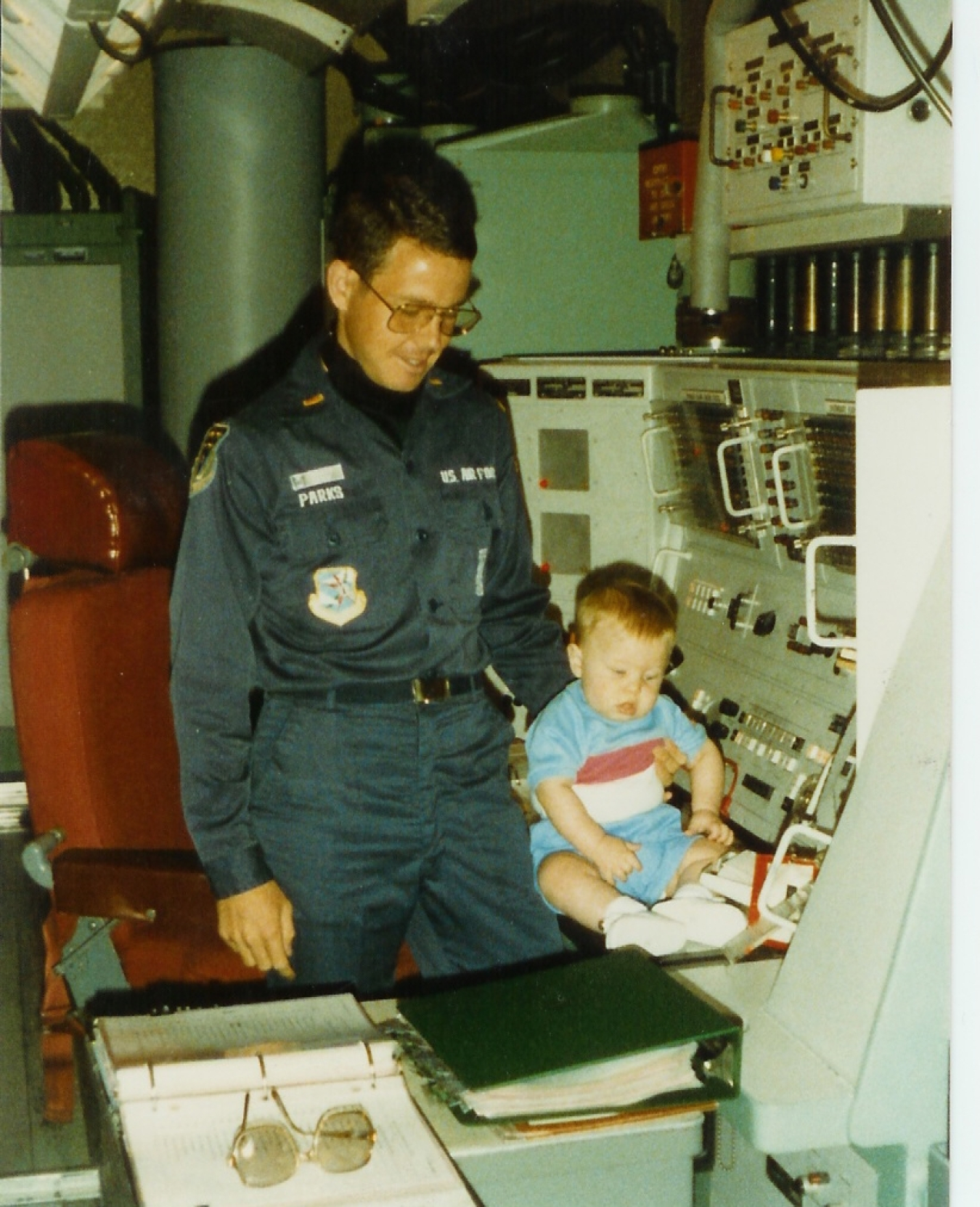
Doc Parks and his son, Brian Parks (today MSgt Brian Parks, USAF) taken at Grand Forks Air Force Base, North Dakota, in 1985 in an intercontinental ballistic missile launch control center simulator.
Ed “Doc” Parks, LM, served 28 years, first as an Army National Guard Infantry tuba player, then in intercontinental ballistic missile operations in the Air Force. He retired at the rank of colonel.
“During my career, I served in various capacities, to include command and staff positions, in nuclear operations. I learned integrity is the foundation of one’s character and provides the foundation for everything else to be built upon. It’s fundamental to building trusting relationships with your peers, superiors and subordinates — trust forms the foundation for great success for individuals, the team, and the larger organization. One aspect of being in the military was always having a clear mission, which is sometimes hard to see in civilian organizations. However, LM’s mission is both clear and vitally important to the American people — hard to find a place in government service that has such a clear and rewarding mission.”
Daniel Sellers, LMSP, served four years as a B-52 crew chief in the Air Force, achieving the rank of staff sergeant.
“With freedom comes responsibility, and our freedom will now and forever be secured by those who are willing to fight for it. There’s no better feeling than when your leadership, teamwork, discipline, accountability, leadership, and the confidence you feel when you do a good job all come together and you hear, ‘Mission Accomplished.’ I’m proud of being part of history that will forever be remembered as the Cold War, which eventually freed the people of East Berlin from communism. The day I heard that famous speech by President Reagan — ‘Mr. Gorbachev, tear down this wall’ — was the day I knew it was time to return to a life, with my family, and move back to Grand Junction, Colorado.”

